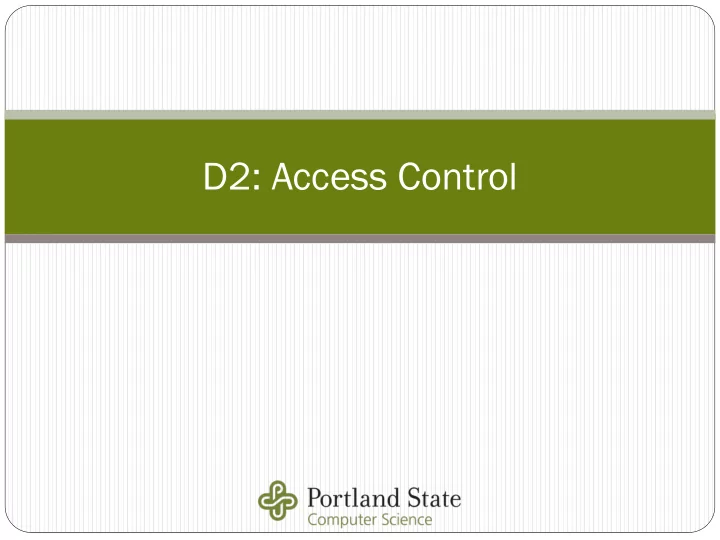

D2: Access Control
#2: Access cess Contr trol ol Similar to OWASP Top 10 Insufficient access control and authentication checks Insecure access control methods Private, internal functions and data are accessible through a contract's public/external functions Results in unauthorized access Loss : estimated at 150,000 ETH (~$30M USD at the time) Portland State University CS 410/510 Blockchain Development & Security
Walkthr kthroug ough h sc scen enario ario A smart contract designates the address which initializes it as the contract's owner in an initialization function Grants special privileges such as the ability to withdraw the contract's funds. Initialization function not protected and can be called by anyone — even after it has already been called Allows anyone to become the owner of the contract and take its funds. Portland State University CS 410/510 Blockchain Development & Security
Ex Example ple Owning a wallet contract (7/19/2017) https://blog.zeppelin.solutions/on-the-parity-wallet-multisig-hack-405a8c12e8f7 It was possible to turn the Parity Wallet library contract into a regular multi-sig wallet and become an owner of it by calling the initWallet function. -- Parity Could have been up to ~$180M, but white hat hackers "stole" the rest and returned it to rightful owners https://medium.freecodecamp.org/a-hacker-stole-31m-of-ether-how-it- happened-and-what-it-means-for-ethereum-9e5dc29e33ce Portland State University CS 410/510 Blockchain Development & Security
Code e vul ulnerability nerability exa xample ple #1 Contract's initialization function sets the caller of the function as its owner. function initContract () public { owner = msg.sender; } Logic is detached from the contract's constructor and does not keep track of the fact that it has already been called. Anyone can call initContract after contract creation to become owner Portland State University CS 410/510 Blockchain Development & Security
Code e vul ulnerability nerability exa xample ple #2 Parity WalletLibrary in example Library used to implement common wallet functions Initializer allows one to specify withdraw limit and owners function initWallet(address[] _owners, uint _required, uint _daylimit) { initDaylimit(_daylimit); initMultiowned(_owners, _required); } Library implemented as an external contract call to reduce costs Rather than have each contract deploy a copy of the exact same library code, wallets do this… Then, use delegatecall() to invoke its functions DELEGATECALL instruction in EVM takes call and invokes the exact same one on the contract you're using it on Portland State University CS 410/510 Blockchain Development & Security
Issue within fallback function Fallback receives payment if someone sends you $ Otherwise, msg.data has unknown function call that should be handled by library since no function in contract matches delegatecall dispatches unknown calls to library function() payable { if (msg.value > 0) Deposit(msg.sender, msg.value); else if (msg.data.length > 0) _walletLibrary.delegatecall(msg.data); } Issue: ALL public calls in library can now be called (including initWallet again!) Leads to.. Rogue initWallet https://etherscan.io/tx/0x707aabc2f24d756480330b75fb4890ef6b8a26ce0554e c80e3d8ab105e63db07 Rogue transfer out of wallet https://etherscan.io/tx/0x9654a93939e98ce84f09038b9855b099da38863b3c2e 0e04fd59a540de1cb1e5 Portland State University CS 410/510 Blockchain Development & Security
Code e vul ulnerability nerability exa xample ple #3 MetaCoin contract for purchasing and exchanging coins sendCoin call to doTransfer from msg.sender to receiver What errors are there? doTransfer not set to internal (can be called externally) No check on from being msg.sender in doTransfer Bonus vulnerability: Underflow and overflow on balances update not checked Portland State University CS 410/510 Blockchain Development & Security
Code e vul ulnerability nerability exa xample ple #4 Same contract What is the error? Contract's password set to "private", but appears in clear on blockchain Find secretPassword and mint coins Everything is public by design Contract code & storage Transaction contents Private modifier does nothing for secrecy! Portland State University CS 410/510 Blockchain Development & Security
Rem emed ediation iation Remove all catch-all function dispatchers (specify exact calls allowed) Ensure calls are internal , unless intended to be external Validate identity before execution using modifiers and via require contract Unprotected{ address private owner; modifier onlyOwner { require(msg.sender==owner); _; } function constructor() public { owner = msg.sender; } // This function should be protected function changeOwner_broken(address _newOwner) public { owner = _newOwner; } function changeOwner_fixed(address _newOwner) public onlyOwner { owner = _newOwner; } } Portland State University CS 410/510 Blockchain Development & Security
SI CTF Lab 3.4, 3.5
Recommend
More recommend